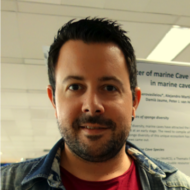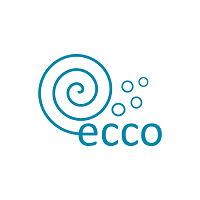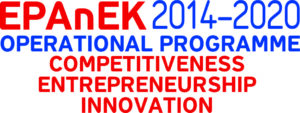Key research areas
Environmental status of marine systems, Long term monitoring of the coastal environment, Effects of climate change on marine organisms, Sustainability management, Assessment of non-indigenous species (NIS), Recreational Diving Oasis with Artificial Reefs, Ocean literacy
The mission of the Ecology and Ecosystem Management research team is to address current environmental challenges in close collaboration with stakeholders and scientific experts. Research focuses on a holistic approach to the sustainable management of natural resources including evaluation and monitoring of fundamental biotic and abiotic factors controlling marine ecosystem processes, biodiversity dynamics, climate change, pollution, conservation and sustainable management of coastal resources and habitats and the development of innovative environmental technology.
- Environmental status of marine systems: with application of specialised indices and protocols, implemented through targeted surveys and field data collections, we are able to assess the Good Environmental Status (GES) and estimate the impact of a range of human and large-scale pressures on marine ecosystems. Additionally we perform coastal habitat mapping in order to identify the distribution of the habitats within a particular area. Produced maps can be used as a useful tool to evaluate the conservation measures regarding the protection of valuable habitats and areas.

- Long-term monitoring of the coastal environment: a bottom-moored seafloor observatory comprising various scientific instruments has been deployed at a depth of 20 m and at a distance of 1500 m from IMBBC land premises for the measurement of coastal sea temperature, salinity, density, sound velocity, dissolved oxygen, chlorophyll-a, turbidity, and current velocity/direction. Continuous field data acquisition, processing and evaluation has been carried out since 2014.

- Effects of climate change on marine organisms: we assess the effect of global climate change phenomena such as sea warming and ocean acidification on the growth, morphology, physiology, reproduction and behaviour of marine organisms through controlled experimental approaches that incorporate morphological data (traditional and 3D imaging micro-CT approaches) and genetic analysis.





- Sustainability management: we assess the vulnerability and conservation status of marine taxa and habitats by combining existing data and current assessments in order to propose guidelines for protection and conservation under national and international advisory or regulatory bodies.

- Assessment of non-indigenous species (NIS): the spread of NIS is an important factor driving ecosystem change in the Mediterranean ecoregions. By using field studies and combining traditional with current experimental approaches (e.g. eDNA metabarcoding), we assess the present status of distribution and evaluate future trajectories.

- Recreational Diving Oasis with Artificial Reefs: we have developed a new type of artificial reef that provides enhanced availability and heterogeneity of microhabitats and larger structural refugia while fully retaining the form and the aesthetics of the natural rocky reefs. This innovative technology is proposed for the development of a recreational diving parks (diving oases) network. The application of this new concept is proposed as a coastal management tool in order to avert the modern trend of establishing recreational diving parks in environmentally sensitive areas of outstanding ecological and conservation importance.

- Ocean literacy: we participate in Working Groups on Ocean Literacy of the European Marine Science Educators Association (EMSEA) and of the European Global Ocean Observing System (EuroGOOS). We are also founding members of the EU4Ocean Platform representing stakeholders from all over Europe and a diverse spectrum of marine – maritime (science, policy, industry, civil society, outreach) and wider ocean literacy, education, youth, media representatives. Within this framework we assess the content knowledge, the attitudes and behaviour of elementary and middle school students as well as the general public with regard to ocean sciences issues. We also develop principles, concepts, policy-oriented documents and citizen science projects promoting good understanding of the role and function of the ocean, which is of paramount importance, constituting the basic tool for the promotion of a healthy and sustainable marine environment, and is a target area of the 2030 Agenda for Sustainable Development.
Related Content
|
Recent Posts
- Special Issue “The Impact of Environmental Risks on Marine Ecology” in the Journal of Marine Science and Engineering. https://www.mdpi.com/journal/jmse/special_issues/environment_risk_ecology
- Interview of Dr Thanos Dailianis (IMBBC) and Prof. Elia Psillakis (TUC) on the use of sponges as natural bioremediators in the newspaper Haniotika Nea: http://www.haniotika-nea.gr/fysikoi-aporrypantes/
- Euronews short documentary “Threats to marine biodiversity” films IMBBC scientists at work https://www.euronews.com/2020/03/31/what-s-killing-our-underwater-ecosystems?fbclid=IwAR33FbFf3VADFxhAo1Nn73iSEDBQfaGvYIsNzDZ4szEfe389nUPy_Md3kHA
- New paper on ecological assessment of ports Dimitriou P, Chatzinikolaou E, Arvanitidis C. 2020. Ecological status assessment based on benthic macrofauna of three Mediterranean ports: Comparisons across seasons, activities and regions. Marine Pollution Bulletin. 153. https://doi.org/10.1016/j.marpolbul.2020.110997
- New paper on environmental risks of commercial harbours Valdor P F, Gomez A G, Steinberg P, Tanner E L, Knights A, Seitz R, Airoldi L, Firth L, Arvanitidis C, Ponti M, Chatzinikolaou E, Brooks P, Crowe T, Smith A, Méndez G, Ovejero A, Soares-Gomes A, Burt J, Macleod C, Juanes J. 2020. A global approach to mapping the environmental risk of commercial harbours on aquatic systems. Marine Policy. 119. https://doi.org/10.1016/j.marpol.2020.104051
- Identification Guide of Vulnerable Species Incidentally Caught In Mediterranean Fisheries (available in English, French and Turkish) https://www.iucn.org/news/mediterranean/201910/identification-guide-vulnerable-species-incidentally-caught-mediterranean-fisheries https://rac-spa.org/node/1864
- New paper on the status of coastal benthic ecosystems in the Mediterranean Sea: Bevilacqua S, Katsanevakis S, Micheli F, Sala E, Rilov G, Sarà G, Abdul Malak D, Abdulla A, Gerovasileiou V, Gissi E, Mazaris AD, Pipitone C, Sini M, Stelzenmüller V, Terlizzi A, Todorova VR, Fraschetti S (2020) The Status of Coastal Benthic Ecosystems in the Mediterranean Sea: Evidence from Ecological Indicators. Frontiers in Marine Science, 7: 475. https://doi.org/10.3389/fmars.2020.00475
- New paper on Mediterranean coralligenous assemblages: Cinar ΜΕ, Feral J-P, Arvanitidis C, David R, Taskin E, Sini M, Dailianis T, Dogan A, Gerovasileiou V, Evcen A, Chenuil A, Dagli E, Aysel V, Issaris Y, Bakir K, Nalmpanti M, Sartoretto S, Salomidi M, Sapouna A, Acik S, Dimitriadis C, Koutsoubas D, Katagan T, Ozturk B, Kocak F, Erdogan-Dereli D, Onen S, Ozgen O, Turkcu N, Kirkim F, Onen M (2020) Coralligenous assemblages along their geographical distribution: testing of concepts and implications for management. Aquatic Conservation: Marine and Freshwater Ecosystems, 30: 1578-1594. https://doi.org/10.1002/aqc.3365
- Mediterranean Multiplier Event of BlueSchoolsMed Project “Supporting the development of socially-inclusive Blue Challenges in schools in the Mediterranean Sea basin” – Marseille France 11-12 May 2023
https://imbbc.hcmr.gr/2023/06/07/mediterranean-multiplier-event-of-blueschoolsmed-project-supporting-the-development-of-socially-inclusive-blue-challenges-in-schools-in-the-mediterranean-sea-basin-marseille-france/ - IMBBC participates with 3 announcements at the 10th EuroGOOS Conference, held between 3 and 5 October 2023. Among them: Ocean Literacy and EU Blue Schools Network as tools for integration of ocean issues into schools curricula, presentation by Dr Koulouri within the framework of BlueS_Med project integrating Ocean Literacy into curriculum and educational activities of Mediterranean schools
https://imbbc.hcmr.gr/2022/05/06/erasmus-training-event-for-teachers-and-students-at-imbbc/



























